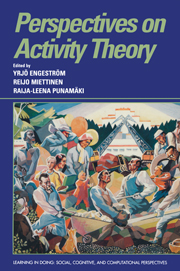Book contents
- Frontmatter
- Contents
- List of contributors
- Series foreword
- Introduction
- Part I Theoretical issues
- Part II Language and its acquisition
- Part III Play, learning, and instruction
- 14 Play and motivation
- 15 Drama games with 6-year-old children: Possibilities and limitations
- 16 Activity formation as an alternative strategy of instruction
- 17 Activity theory and history teaching
- 18 Didactic models and the problem of intertextuality and polyphony
- 19 Metaphor and learning activity
- 20 Transcending traditional school learning: Teachers' work and networks of learning
- Part IV Technology and work
- Part V Therapy and addiction
- Author index
- Subject index
16 - Activity formation as an alternative strategy of instruction
Published online by Cambridge University Press: 05 June 2012
- Frontmatter
- Contents
- List of contributors
- Series foreword
- Introduction
- Part I Theoretical issues
- Part II Language and its acquisition
- Part III Play, learning, and instruction
- 14 Play and motivation
- 15 Drama games with 6-year-old children: Possibilities and limitations
- 16 Activity formation as an alternative strategy of instruction
- 17 Activity theory and history teaching
- 18 Didactic models and the problem of intertextuality and polyphony
- 19 Metaphor and learning activity
- 20 Transcending traditional school learning: Teachers' work and networks of learning
- Part IV Technology and work
- Part V Therapy and addiction
- Author index
- Subject index
Summary
Introduction
Teachers' experiences and countless studies show that in the majority of classrooms real learning results do not correspond with either the expectations of society or the efforts of most of the teachers and learners. High rates of forgetting, low levels of applicability of knowledge and skills, insufficient quality of problem finding and problem solving, and aversion to school learning are often demonstrated in discussions and reports.
Results from one of our studies illustrate this point. Fourth-grade pupils (10 to 11 years of age) had to solve two text problems. Both problems had the same mathematical structure but were different in content. The mathematical structure of both problems corresponded with the students' available mental preconditions. In both cases, the same operations (addition and multiplication of whole numbers) had to be used. The first problem referred to familiar things often used in such tasks. The second problem, however, was about liquids, a type of problem with which the children had little calculatory experience.
The study was part of a larger investigation performed in normal classrooms in several schools (Reinhold, 1988). Earlier results obtained with different methods allowed us to select pupils as representatives of relatively homogeneous performance groups (high, average, and low performance). The difficulties in uncovering the mathematical structure and in finding necessary operations increased sharply from performance group I (high) to group III (low) (Figure 16.1). Students with similar psychological characteristics but taught on the basis of another instructional strategy reached significantly higher results, although differences between the performance groups show the same trend that occurs in the classes that received traditional instruction.
- Type
- Chapter
- Information
- Perspectives on Activity Theory , pp. 264 - 281Publisher: Cambridge University PressPrint publication year: 1999
- 4
- Cited by



